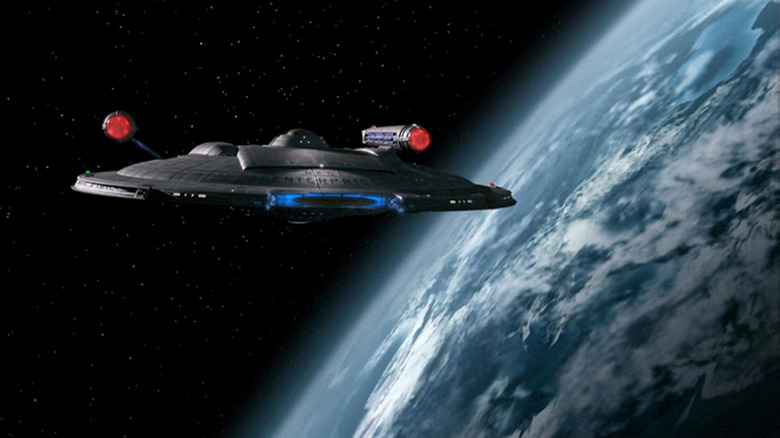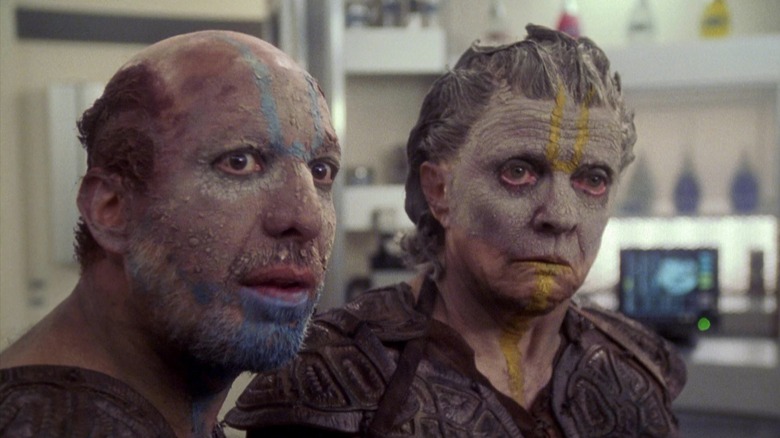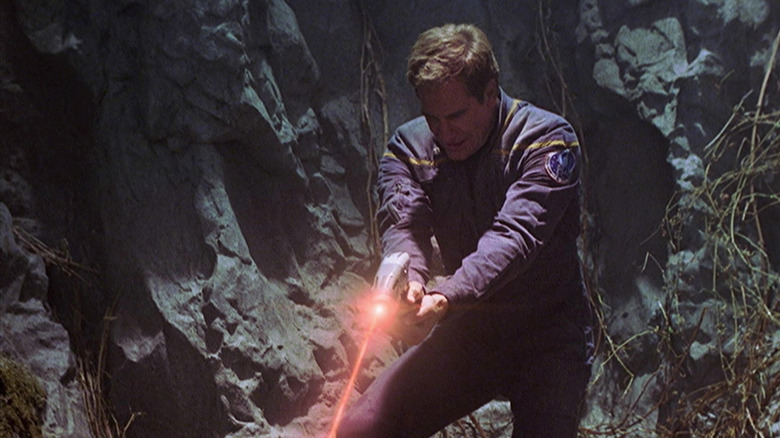The Season One Star Trek: Enterprise Episode That Spelled Doom For The Entire Series
It's worth recalling that "Star Trek: Enterprise" is one of the less popular "Star Trek" shows. "Enterprise" debuted in late September 2001, and was set about a century before the events of the original "Star Trek" series. It followed the adventures of the very first human vessel sent on a long-range space voyage, and took place at a time when a lot of familiar "Star Trek" technologies/notions hadn't been invented yet; there were no tractor beams, no shields, no human-safe transporters, and no Prime Directive. "Enterprise" clearly wanted to revive the old-world frontiersmanship so familiar to fans of the 1966 series.
"Enterprise," however, only lasted four seasons; the three previous Trek shows ran for seven years each. The series was canceled in 2005, and, at the time, it seemed like "Star Trek" was pretty much over and done with. Some might credit the show's writing as a culprit for its unpopularity; it was slower-paced and more pointedly old-fashioned than the shows that came before it. Others might posit that "Star Trek," with its messages of peace and diplomacy, didn't have a place in a vengeance-mongering, post-9/11 America. Whatever the reason, "Enterprise" is largely seen as a failure, a hokey Trek that never found its footing.
"Enterprise" co-creator Brannon Braga would agree with that last statement. In the oral history book "The Fifty-Year Mission: The Next 25 Years: From The Next Generation to J. J. Abrams" edited by Mark A. Altman and Edward Gross, Braga admitted that he saw the writing on the wall very early on. Evidently, he felt that "Terra Nova" (October 24, 2001), only the sixth episode of the series, proved that "Enterprise" was pointed in the wrong direction.
Terra Nova
"Terra Nova" sees the U.S.S. Enterprise visiting a remote Earth colony that had remained incommunicado for 70 years. The colonists arrived on a planet that almost immediately suffered an immense environmental cataclysm, causing radiation levels on the surface to skyrocket. As such, they all moved into a network of nearby caves and had been living underground for the ensuing decades. The Enterprise arrives and offers to relocate the colonists back to Earth — space travel technology had just recently advanced enough to do so hastily — but they refuse to leave their home, having developed a unique underground culture. Eventually, Captain Archer (Scott Bakula) convinces the untrusting colonists to be relocated to a similar planet that also has a network of caves, allowing them to remain underground.
Braga, who bears a "story by" credit on "Terra Nova," recalls the episode with dismay. He felt that "Enterprise" started well enough, and was different from "Star Trek: Voyager" or "Star Trek: Deep Space Nine," but that it was ultimately becoming very same-y very quickly. Braga said:
"It was rough. I was pretty depressed, because I felt like the first episode after the pilot was good, and then the third was good, and then there was some episode called 'Terra Nova' and it was dreadful. It was a stinker, and I thought, 'we're in trouble.' It happened that quickly. I was hoping to do something more serialized and felt like I was in a situation where I'm starting to fall into some familiar rhythms."
"Terra Nova" is certainly not as terrible as Braga describes, but one has to admit that it contained a story that could have been told on any of the "Trek" shows; it didn't need "Enterprise" to function.
It wasn't all bad
Braga did feel, however, that "Enterprise" still had plenty of high notes, even in its oft-lambasted early seasons. He cited the 13th episode of the series, "Dear Doctor" (January 23, 2002) as a notable example of how well things were going. It may have helped that the episode in question featured Dr. Phlox (John Billingsley), perhaps the best character in the series. Braga described the episode thus:
"When the show worked, I thought it worked beautifully. In the first season, there was one of the best episodes of Star Trek I ever produced, called 'Dear Doctor.' It was about Dr. Phlox on an interspecies medical exchange and he has a human counterpart on another ship. It's about his letters to this doctor and his observations on humanity, and it ends up being about a very serious issue of inadvertent genocide. To me, it had all the humanity and humor that I hoped the show would engender, and it was a show you only could have told on 'Enterprise.'"
I can only speak for myself and my Trekkie peers, but there was a sense in 2002 that "Star Trek" was getting tired. After 21 collective seasons of quality entertainment provided by "Star Trek: The Next Generation," "Deep Space Nine," and "Voyager," there was definitely some Trek fatigue. It didn't help that the 2002 movie "Star Trek: Nemesis" wasn't very good. Many Trekkies watched "Enterprise" less from enthusiasm and more from a weary sense of fan obligation (see also: anyone who is still following the MCU or "Star Wars" in 2024).
These days, "Enterprise" has been reevaluated somewhat, leading to a more forgiving fandom. But for a while, it was, as Braga said, rough.


